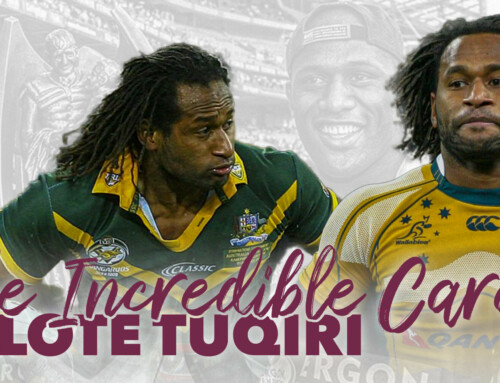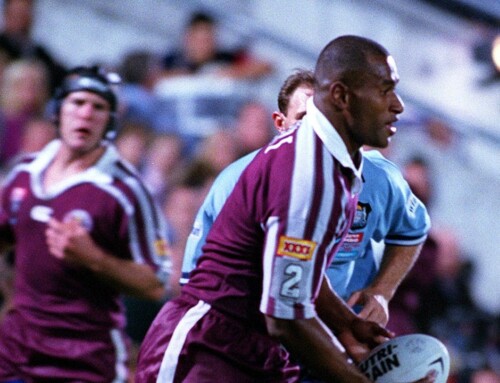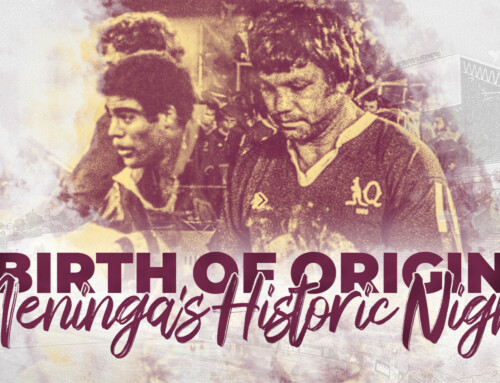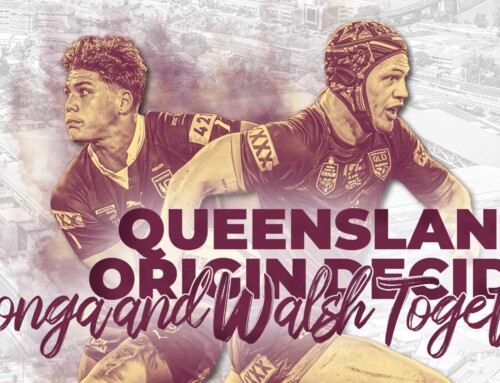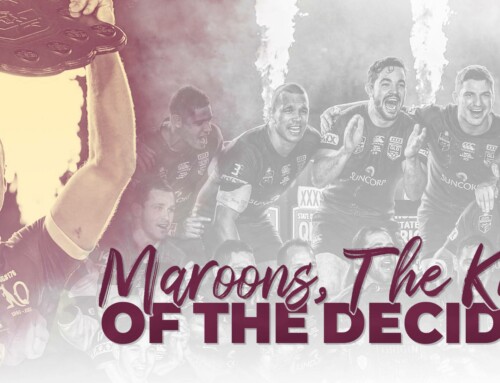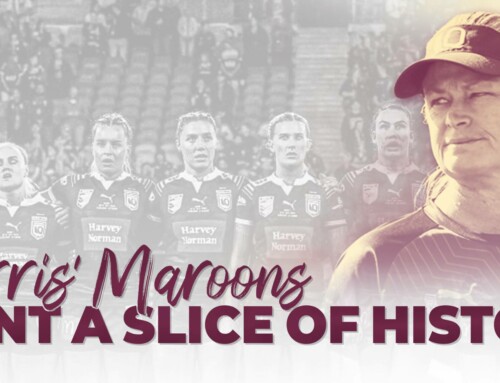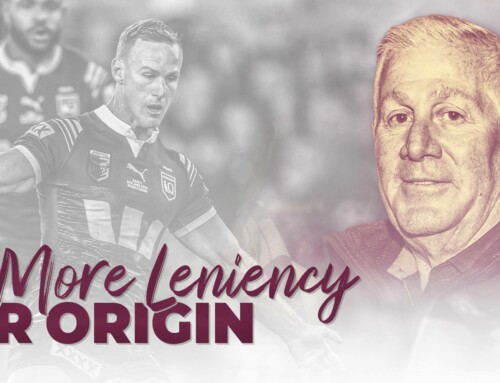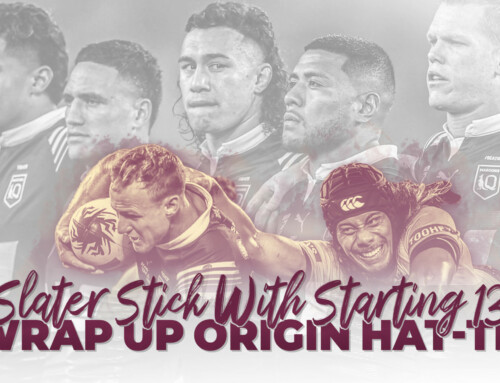QUEENSLAND coach Mal Meninga says State of Origin’s new eligibility rules have removed the shades of grey from the annual battle between Maroon and Blue
The Australian Rugby League Commission announced in December that from this year, a player will only be eligible for Queensland or NSW if he lived in that state before turning 13 – or if he is the son of a former Origin player.
The new rules have drawn a definitive line in the sand of eligibility, after recent seasons saw a number of players become the centre of a selection tug-of-war with the New Zealand Rugby League.
There is no longer any doubt about a player’s eligibility, because their minds have been made up for them by the new pre-13 residential rule – and Meninga couldn’t be happier.
“It just takes away the grey areas, and really, that is all we needed,” Mal said. “Everything is now there in black and white.
“There is a rule now that is easy to understand and doesn’t need to come down to interpretation.
“Most importantly, the decision has been taken out of the players’ hands – which removes any suggestion that players might be coerced into playing Origin for greater financial rewards.
“The criteria is established now, it is in black and white, and that should be the end of the arguments.”
Meninga said the age limit got the balance right, and would help preserve junior football as well.
“One of the things we were asked about when discussing how to clarify the eligibility rules was what the age cut-off should be,” Mal said. “I think that 13 is a good age, because it is the age where they start playing rugby league under the senior, international rules. It is also the age where players start making junior rep teams.
“Now the ball is in the court of the New Zealand Rugby League to foster their own junior talent, and not rely on the resources and expertise of the people in Queensland and New South Wales to hone the skills of these kids and turn them into footballers, just so the Kiwis can come along and claim them because of grandma’s passport.
“I know that people south of the border have been trumpeting this as a victory to stop another Greg Inglis situation happening again. And, under the new rule, Greg would not be eligible to play for Queensland given that he didn’t move here until he was 16.
But what needs to be remembered in Greg’s case is that the decision to play for Queensland was his own. It wasn’t like the Queensland Rugby League, or me or anybody else pursued him to have him change his allegiance.
Greg wanted to play for Queensland. He was chosen because he is obviously a great player, but also because under the previous rule, he qualified for Queensland.
There wasn’t anything sneaky or underhanded about it. We picked a player under the rules that existed at the time – the same way that NSW picked Bundaberg’s Ken Nagas to play for the Blues in the 1990s.”
The building and development works around Queensland’s Origin empire continue this month, with the state’s best Junior Emerging Origin (under-20s) and Emerging Origin squad’s gathering for the annual Queensland Academy of Sport camps in Brisbane.
“We will have the under-20s in camp on the 17th, with Kevvy Walters and his staff and the QAS program,” Mal said.
“That is being funded by the 1980 Initiative, which is fantastic. They are the ones who have brought together the funds for that, to keep developing the younger guys, and give them an opportunity in this type of arena.
“Then Wayne Bennett and the QAS will run the senior Emerging squad, which is over the Australia Day long weekend.
“Having Wayne and Kevvy there will be fantastic, and also this year we will have Darren Lockyer and Petero Civoniceva on board. So that is a terrific move for us, and continues our development and planning for the future of Origin off the field as well.”
Mal said both camps were a crucial part of Queensland’s Origin planning – both in the short and long-term.
“It is the best way to find out what they are like, and helps us paint a picture of the type of player and person we will be getting if we look towards them in the future for Origin,” he said.
“It also helps them know that we are looking at them, and hopefully that inspires them to keep doing what they are doing, and working hard to achieve their goals.
“It is the same with the senior Emerging squad. We have got a number of Origin-quality players who are just waiting for their opportunity to come. When it does, these camps will help ensure they are ready.
“It is important that we recognise their talents, and acknowledge ho close they are to selection. It has been proven in the past that guys make their Origin debut after coming through that Emerging squad.
“It is a well functioning program that provides a great benefit to everyone. The players understand that they are being watched as being on the cusp of Origin, and it allows us to get a closer look at their skills and personalities and see what they are made of.”
Senior Queensland Emerging Origin squad: Ben Barba (Bulldogs), Justin O’Neill (Storm), Dale Copley (Broncos), Daly Cherry-Evans (Manly), Andrew McCullough (Broncos), Martin Kennedy (Sydney Roosters), Josh McGuire (Broncos), William Zillman (Titans), Chris McQueen (South Sydney), Josh Papalli (Raiders), Edrick Lee (Raiders), Michael Morgan (Cowboys), Ben Ridge (Titans) and Aidan Guerra (Sydney Roosters).
Junior Queensland Emerging Origin squad: Caleb Timu (Broncos), Corey Oates (Broncos), Chris Grevsmuhl (Cowboys), Hymel Hunt (Titans), Kurt Mann (Melbourne), Ian Riccardi (Penrith), Anthony Milford (Raiders), Travis Peeters (Broncos), Francis Molo (Broncos), Zac Santo (Cowboys), Kierran Moseley (Penrith), Patrick Mago (Raiders), Soape Palau (Broncos), Patrick Kaufusi (Cowboys), Moses Mbye (Bulldogs), Cameron Cullen (Broncos), Brenko Lee (Raiders), Joseph Forrester (Broncos), John Folau (Eels), Billy Brittain (Storm), Ben Hampton (Storm), Luke Keary (South Sydney), Dylan Napa (Sydney Roosters), Korbin Sims (Knights), Lachlan Maranta (Broncos), Aaron Whitchurch (Broncos).



